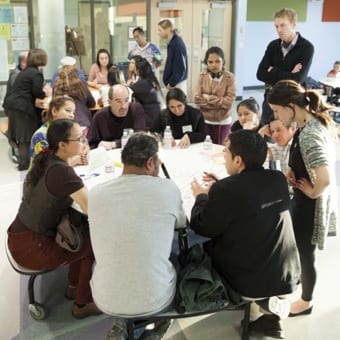Who is a member?
Our members are the local governments of Massachusetts and their elected and appointed leadership.
Mass Innovations, From the Beacon, January 2015
 In Somerville, where more than one-third of households speak a language other than English, the city has launched a program to make immigrants aware of services the city can offer them and to get them more involved in civic life.
In Somerville, where more than one-third of households speak a language other than English, the city has launched a program to make immigrants aware of services the city can offer them and to get them more involved in civic life.
SomerViva grew out of a community planning process designed to guide city policy and priorities over a 20-year period. The program features three “language liaisons,” each a native speaker of either Spanish, Portuguese or Haitian Creole. (The Haitian Creole liaison also is fluent in French, another language spoken by immigrants in the city.)
Each liaison works to make sure that city information is reaching people who are not proficient in English. The liaisons also prepare press releases and handle what Denise Taylor, the city’s communications coordinator, described as “low-tech outreach” – making sure, for example, that translated announcements are posted in City Hall and public schools, as well as in community centers and churches.
Many of the immigrants were more comfortable meeting at their churches rather than coming to City Hall, and some distrust government in general, based on experiences in their native countries. Some of the SomerViva meetings in churches drew between 100 and 200 people, according to Taylor.
“We realized that there was a really big trust factor,” she said.
Many of the meetings focus on practical matters such as the city’s affordable-housing program, which is serving far more people than before the advent of SomerViva, according to Taylor.
Other initiatives are designed to get immigrant communities more involved in Somerville’s cultural events, a move that was prompted in part by a series of visioning sessions the city conducted a few years ago. One event in 2014 involved people from Brazil and Haiti jointly celebrating their teams’ participation in soccer’s World Cup. Recently, the Somerville Arts Council has been offering programs geared toward immigrants, including a class on cooking Creole cuisine.
Through interaction with immigrants, city staff also discovered that local radio is flourishing among immigrant communities in or near Somerville, making it an ideal place for the city to make public service announcements.
Much of the work of the language liaisons, however, involves helping people get the services they need. Initially, the liaisons worked just eight hours a week, but now the jobs are full-time, and the range of duties has grown.
“We don’t have a routine,” said Adriana Fernandes, the Portuguese-speaking liaison.
Jhenny Saint-Surin, the Haitian Creole liaison, offered “an example of how not routine this position is.” She described how, on a day she expected to spend her time translating documents, she received a call from Somerville High School informing her that a student had arrived in tears because her family was being evicted. Saint-Surin said she connected the student with the Somerville Homeless Coalition, helped her fill out some applications, and made plans to help the student’s mother find a job.
“I can’t promise anything, but I will be there for linguistic support, and I will help them in anyway I can,” she said.
For more information, contact Denise Taylor at (617) 625-6600, ext. 2103.